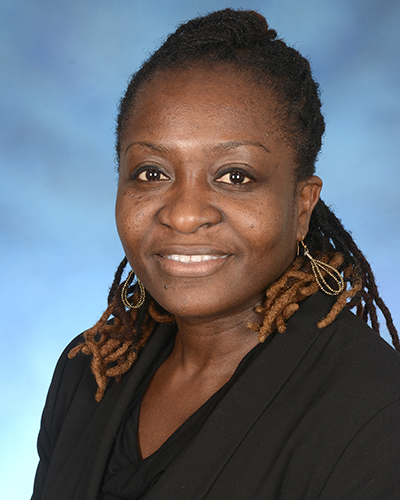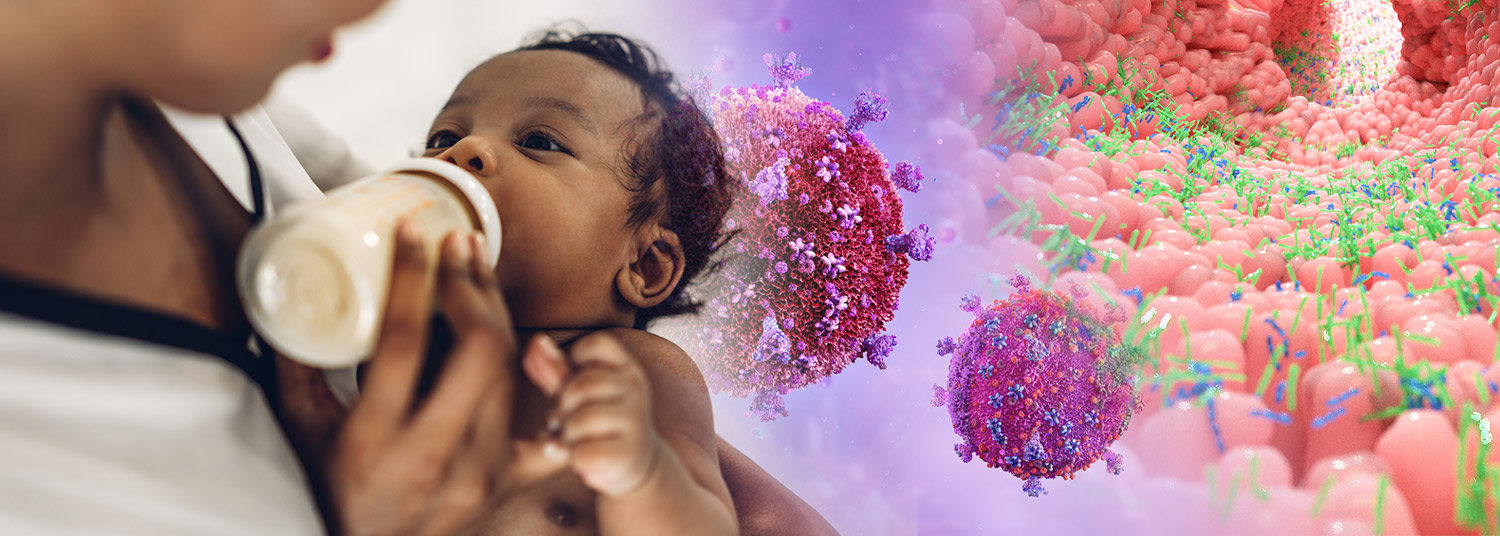June 23, 2022 | Heide Aungst
The Research, Conducted by the UM School of Medicine, Could Lead to New Treatments
Babies born to women with HIV often have poorer health and under-developed growth in the early months of life than infants born to women without the infection — even if those babies don’t contract HIV during birth, according to a new study by researchers at the University of Maryland School of Medicine (UMSOM)’s Institute for Genome Sciences (IGS) and Institute of Human Virology (IHV). The study also provides new insights into why these health issues often continue throughout the babies’ lives.
.jpg) Science has come far in preventing HIV transmission from mother to baby, thanks to the standard use of antiretroviral therapy (ART) for HIV-positive pregnant women. However, babies of HIV-positive mothers still struggle with slower growth and adverse health outcomes.
Science has come far in preventing HIV transmission from mother to baby, thanks to the standard use of antiretroviral therapy (ART) for HIV-positive pregnant women. However, babies of HIV-positive mothers still struggle with slower growth and adverse health outcomes.
In the study published online in April in Microbiome, scientists at the Institute for Genome Sciences (IGS) and Institute for Human Virology, both at UMSOM, found a complex interaction of factors shaped babies’ development and health. These included maternal HIV status, infants’ gut microbiota, the length of time that mothers breastfed, and the breastmilk composition.
For 18 months, study leaders Claire Fraser, PhD, the Dean’s Endowed Professor of Medicine at UMSOM and Director of IGS, and Man Charurat, PhD, MHS, Professor of Medicine at UMSOM and the Division Director of Epidemiology & Prevention at UMSOM’s Institute of Human Virology, along with colleagues followed a group of 272 Nigerian babies born to mothers with and without HIV. All mothers with HIV in this study were being treated with ART, and none transmitted the virus to their newborns.
Surprisingly, the researchers found no significant differences between the gut and vaginal microbiomes of the mothers with and without HIV, as well as no difference in the gut microbiomes of the babies at birth. Infants born to mothers with HIV exhibited lower weight-to-age Z-scores (WAZ) at birth in comparison to infants born to uninfected mothers. The Z-score measures the distance away from a particular data point. These differences persisted throughout the 18-month study and were further exacerbated in infants who were not breastfed.
The World Health Organization recommends that HIV-positive mothers breastfeed exclusively for six months and continue to nurse, along with solid food, for up to two years. The Fraser/Charurat team discovered that by six months, 99 percent of mothers without HIV were still breastfeeding, but only 39 percent of mothers with HIV were breastfeeding. The numbers became even more discrepant at nine months: 95% of mothers without HIV still breastfed their infants, and only 17% mothers with HIV were still breastfeeding.
“We’ve long known that the composition of the gut microbiome in infants impacts their overall health, growth, and development. That composition is strongly influenced by what the babies eat early in life,” Dr. Fraser said.
Scientists know that the gastrointestinal tracts of healthy breastfed infants are filled with the bacteria Bifidobacterium. The loss of this – or invasion of other types of bacteria – can predispose an infant to metabolic and autoimmune diseases throughout life.
 “We wondered whether the lack of breastfeeding in infants of HIV-positive mothers during the first weeks and months postpartum was associated with a lower abundance of Bifidobacteria and, in fact, we found significantly less of that genus in non-breastfed babies,” Dr. Fraser explained. “We also thought that lower amount might impact a baby’s weight, and, again, low Bifidobacteria led to lower infant weight.”
“We wondered whether the lack of breastfeeding in infants of HIV-positive mothers during the first weeks and months postpartum was associated with a lower abundance of Bifidobacteria and, in fact, we found significantly less of that genus in non-breastfed babies,” Dr. Fraser explained. “We also thought that lower amount might impact a baby’s weight, and, again, low Bifidobacteria led to lower infant weight.”
Is it how long a baby receives breastmilk or is it the content that makes a difference?
“It seems that it is both,” Dr. Fraser said. “There’s a difference in growth between babies of mothers with HIV who were breastfed longer and those who stopped early on. We discovered that the presence of ART in breastmilk correlated with a lower abundance of Bifidobacteria in the infant gut microbiome as well.”
Researchers don’t know whether the ART drug metabolites directly impact Bifidobacteria levels.
“It seems that breastfeeding helps close the gap between the babies in the two different groups,” Dr. Fraser explained. “It may mean that breastmilk containing ART metabolites may be less than ideal – perhaps ART is directly toxic to some of the gut microbes.”
Dr. Fraser said, the use of Bifidobacterium probiotic supplement may be one way to help strengthen the gut — and ultimately reduce disease — in babies born to mothers with HIV. A stronger gut, then, could reduce ongoing poor growth and mortality among those infants.
 “We recognize there are other confounding factors, like available food choices in impoverished areas, that could play a role in this complex interaction between mothers with HIV and their newborns’ health,” Dr. Charurat added. “We will be taking a deeper dive into this research.”
“We recognize there are other confounding factors, like available food choices in impoverished areas, that could play a role in this complex interaction between mothers with HIV and their newborns’ health,” Dr. Charurat added. “We will be taking a deeper dive into this research.”
Albert Reece, MD, PhD, MBA, Executive Vice President for Medical Affairs, UM, Baltimore, the John Z. and Akiko K. Bowers Distinguished Professor, and Dean at the University of Maryland School of Medicine said, “This research is critical to allow babies born to mothers with HIV to thrive alongside their peers whose mothers have not contracted HIV.”
The research reported in this publication was supported by the National Institute of Dental and Craniofacial Research of the National Institutes of Health under Award Number R01DE025174. Additional support was provided by the Dean’s Endowed Professorship to Claire M. Fraser, PhD (University of Maryland School of Medicine). Olivia A. Martin is a TL1 post‐doctoral fellow supported by 1TL1TR003100‐01, 1UL1TR003098‐01, and the University of Maryland, Baltimore, Institute for Clinical and Translational Research.
The authors have no conflicts of interest.
About the University of Maryland School of Medicine
Now in its third century, the University of Maryland School of Medicine was chartered in 1807 as the first public medical school in the United States. It continues today as one of the fastest growing, top-tier biomedical research enterprises in the world -- with 46 academic departments, centers, institutes, and programs, and a faculty of more than 3,000 physicians, scientists, and allied health professionals, including members of the National Academy of Medicine and the National Academy of Sciences, and a distinguished two-time winner of the Albert E. Lasker Award in Medical Research. With an operating budget of more than $1.3 billion, the School of Medicine works closely in partnership with the University of Maryland Medical Center and Medical System to provide research-intensive, academic and clinically based care for nearly 2 million patients each year. The School of Medicine has nearly $600 million in extramural funding, with most of its academic departments highly ranked among all medical schools in the nation in research funding. As one of the seven professional schools that make up the University of Maryland, Baltimore campus, the School of Medicine has a total population of nearly 9,000 faculty and staff, including 2,500 students, trainees, residents, and fellows. The combined School of Medicine and Medical System (“University of Maryland Medicine”) has an annual budget of over $6 billion and an economic impact of nearly $20 billion on the state and local community. The School of Medicine, which ranks as the 8th highest among public medical schools in research productivity (according to the Association of American Medical Colleges profile) is an innovator in translational medicine, with 606 active patents and 52 start-up companies. In the latest U.S. News & World Report ranking of the Best Medical Schools, published in 2021, the UM School of Medicine is ranked #9 among the 92 public medical schools in the U.S., and in the top 15 percent (#27) of all 192 public and private U.S. medical schools. The School of Medicine works locally, nationally, and globally, with research and treatment facilities in 36 countries around the world. Visit medschool.umaryland.edu
About the Institute for Genome Sciences
The Institute for Genome Sciences (IGS) at the University of Maryland School of Medicine has revolutionized genomic discoveries in medicine, agriculture, environmental science, and biodefense since its founding in 2007. IGS investigators research areas of genomics and the microbiome to better understand health and disease, including treatments, cures, and prevention. IGS investigators also lead the development of the new field of microbial forensics. IGS is a leading center for major biological initiatives currently underway including the NIH-funded Human Microbiome Project (HMP) and the NIAID-sponsored Genomic Sequencing Center for Infectious Diseases (GSCID). Follow us on Twitter @GenomeScience.
About the Institute of Human Virology
Formed in 1996 as a partnership between the State of Maryland, the City of Baltimore, the University System of Maryland, and the University of Maryland Medical System, the IHV is an institute of the University of Maryland School of Medicine and is home to some of the most globally-recognized and world-renowned experts in all of virology. The IHV combines the disciplines of basic research, epidemiology, and clinical research in a concerted effort to speed the discovery of diagnostics and therapeutics for a wide variety of chronic and deadly viral and immune disorders, most notably HIV, the virus that causes AIDS. For more information, visit ihv.org and follow us on Twitter @IHVmaryland.
Contact
Heide Aungst, MA
Institute for Genome Sciences (IGS)
University of Maryland School of Medicine
HAungst@som.umaryland.edu
(216) 970-5773
Related stories
.jpg)
Wednesday, March 01, 2023
Internationally-Renowned Scientist Claire Fraser, PhD, To Step Down as Director of the University of Maryland School of Medicine's Institute for Genome Sciences
Claire Fraser, PhD, a pioneer and global leader in genomic research, has announced that she will step down from her position as Director of the Institute for Genome Sciences (IGS) in the University of Maryland School of Medicine (UMSOM). She will now continue as the Dean E. Albert Reece Endowed Professor and Professor of Medicine and Microbiology and Immunology at UMSOM and scientist at IGS until she retires in 2024.

Tuesday, July 19, 2022
Six-Country African Study Shows COVID-19 Can Be Dangerous in Pregnancy
A new study involving hospitalized women in six African countries from the University of Maryland School of Medicine’s (UMSOM) Institute of Human Virology (IHV) showed that pregnant women with SARS-CoV-2, the virus that causes COVID-19, had double the risk of being admitted to the intensive care unit (ICU) and four-times the risk of dying in-hospital than pregnant women who did not have COVID-19.

Wednesday, May 25, 2022
NIH Awards Grant to Train Global Health Scientists in Low-and-Middle-Income Countries
Researchers at the University of Maryland School of Medicine (UMSOM) received a $5.5 million award from the National Institute of Health’s Fogarty International Center to help foster the next generation of global health scientists. The award entitled, “Integrated Network of Scholars in Global Health Research Training (INSIGHT)” will expand global health research across sub-Saharan Africa, South Asia, Latin America, and the Caribbean by providing one-year mentored research training to U.S. and lower-middle income country scholars.

Friday, May 20, 2022
NIH Grant Awarded to Study HIV Drug-Resistant Genetic Mutations Across Africa
University of Maryland School of Medicine (UMSOM)’s Institute of Human Virology (IHV) researchers received funding from the National Institutes of Health’s National Institute of Allergy and Infectious Diseases (NIAID) for $2.7 million to study genetic changes in two genes from the HIV-1 virus that may make it resistant to antiretroviral therapy. The study, named INSPIRE, will analyze genetic variation in types of HIV circulating in a handful of African countries that will help to better understand the implications of these mutations and will improve clinical management of patients.
.jpg)
Wednesday, September 15, 2021
Probiotic-Containing Yogurt Protects Against Microbiome Changes That Lead to Antibiotic-Induced Diarrhea, Study Finds
Eating yogurt containing a particular strain of a well-studied probiotic appears to protect against harmful changes in the gut microbiome that are associated with antibiotic administration. That is the finding from a new randomized clinical trial, led by researchers at the University of Maryland School of Maryland (UMSOM), the University of Maryland School of Pharmacy (UMSOP), and Georgetown University Medical Center, which was recently published in the journal Nutrients.

Thursday, March 18, 2021
UM School of Medicine Helps Maryland Conduct State-Wide Sequencing of Variants in Positive COVID-19 Test Specimens
In an effort to monitor the spread of COVID-19 variants in the State of Maryland, University of Maryland School of Medicine (UMSOM) Dean E. Albert Reece, MD, PhD, MBA, announced that UMaryland Genomics at UMSOM will perform genome sequencing of variants in at least 10 percent of COVID-19 test samples, reaching an important benchmark set by the federal government to help control the spread of these variants.

Monday, June 24, 2019
UM School of Medicine's Institute of Human Virology Awarded $40 Million Grant to Conduct HIV Population Surveys
Man Charurat, MD, Professor of Medicine, Director, Center for International Health, Education, and Biosecurity (CIHEB), and Director, Division of Epidemiology and Prevention, Institute of Human Virology (IHV) at the University of Maryland School of Medicine (UMSOM), has been awarded a five-year grant from the U.S. Centers for Disease Control and Prevention (CDC) to conduct HIV population-based HIV impact assessments worldwide to measure the progress towards the control of the HIV epidemic

Tuesday, February 12, 2019
UMSOM Scientists Call for Unrestricted Usage of Public Genome Data
Researchers at the Institute for Genome Sciences (IGS) at the University of Maryland School of Medicine (UMSOM) called for open access to genome data, stating that unrestricted usage is needed for progress in combating the world’s most serious diseases.

Tuesday, December 04, 2018
UMSOM/UMSOP Researchers Awarded $1.78 Million Grant to Study Brain-To-Gut Connection in Schizophrenia
Researchers at the University of Maryland School of Medicine’s (UMSOM) Maryland Psychiatric Center (MPRC) and Institute for Genome Sciences (IGS), along with researchers at the University of Maryland School of Pharmacy (UMSOP), have been awarded a collaborative five-year $1.78 million grant to study the brain-to-gut connection in schizophrenia.

Monday, February 08, 2016
UM SOM Researchers Identify Most Dangerous Strains of Often-Deadly Bacteria
A multi-disciplinary group of researchers at the University of Maryland School of Medicine (UM SOM) have for the first time determined the genetic makeup of various strains of E. coli, which every year kills hundreds of thousands of people around the world.

Thursday, January 21, 2016
UM SOM Board Member and Benefactor Robert E. Fischell, Awarded Presidential Medal
The White House has awarded Robert E. Fischell, ScD, a member of the University of Maryland School of Medicine (UM SOM) Board of Visitors, the National Medal of Technology and Innovation, the highest honor for technological achievement bestowed by the president of the United States. Previous recipients have included such luminaries as Steven Jobs and Stephen Wozniak (Apple Computer, Inc.), Stephen D. Bechtel, Jr. (Bechtel Group, Inc.), David Packard (Hewlett-Packard Company), Clarence L. Johnson (Lockheed Corporation), Edwin H. Land (Polaroid Corporation) and Edith Flanigen (Union Carbide).

